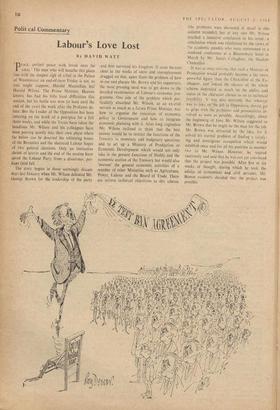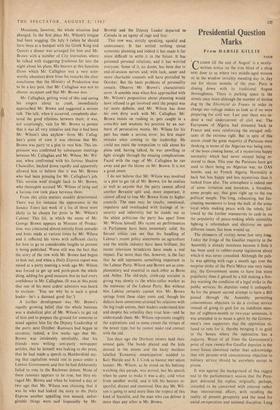Po lit cal Commentary
Labour's Love Lost
By DAVID WATT
p
' EACE, perfect peace with loved ones far away.' The man who will breathe this pious line with the deepest sigh of relief in the Palace of Westminster on end-of-term Friday is not, as you might suppose, Harold Macmillan, but Harold Wilson. The Prime Minister, Heaven knows, has had his little local difficulties this session, but his battle was won (at least until the end of the year) the week after the Profumo de- bate. But the Leader of the Opposilion has been tottering on the brink of a precipice for a full three weeks, and while the Tories have taken the headlines Mr. Wilson and his colleagues have been peering quietly into their own abyss where far below can be descried the whitening bones of the Bevanitcs and the shattered Labour hopes of two general elections. Only ,an instinctive shrink of horror and the end of the session. have saved the 1.abour .Party from a disastrous, per- haps fatal fall.
The story begins in those seemingly distant days last January when Mr. Wilson defeated Mr. George Brown for the leadership of the party and first surveyed his kingdom. It soon became clear as the weeks of snow and unemployment dragged on that, apart from the problem of how to use and placate Mr. Brown and his supporters, the most pressing need was to get down to the detailed examination of Labour's economic pro- gramme. One side of the problem which par- ticularly absorbed Mr. Wilson, as an ex-civil servant as much as a future Prime Minister, was how to organise the execution of economic policy. in Government and how to integrate economic planning with it. After long cogitation Mr. Wilson inclined to think that the best answer would be to restrict the functions of the Treasury to monetary and budgetary questions and to set up a Ministry of Production or Economic Development which would .not only take in ,the present functions of Neddy and the economic section of the Treasury but would also 'oversee' the general economic activities of a number of other Ministries such as Agriculture, Power, Labour and the Board of Trade. There are serious technical objections to this scheme (the problems were discussed in detail in this column recently), but at any rate Mr. Wilson reached a tentative conclusion in his mind a conclusion which was reinforced by the views. of the academic pundits who were summoned to a weekend conference at a Bloomsbury hotel in March by Mr. James Callaghan, the Shadow Chancellor It was at once obvious that such a Minister of Production would probably become a far more powerful figure than the Chancellor of the Ex- chequer, and indeed the sUccess of the whole scheme depended as much on the ability and status of the character chosen as on its technical feasibility. It was also desirable that Nvhoever was to take on the job in Opposition should ..get to grips with the problems and personalities in- volved as soon as possible. Accordingly, about the beginning of June Mr. Wilson suggested to Mr. Brown that he might be the man for the job. Mr. Brown was attracted by the idea, for it solved his eternal problem of finding a satisfy- ing and prestigious occupation which would establish once and for all his position as number two to Mr. Wilson. However, he' reacted cautiously and said that he 'was.not yet convinced that the project was possible. .After five or six weeks of thought, during. which he took the advice of economists and civil servants, Mr. Brown evidently decided that the project was possible. Meantime, however, the whole situation had changed. In the first place Mr. Wilson's tongue had been wagging. On July 9 (when he should have been at a banquet with the Greek King and Queen) a dinner was arranged for him and Mr. Brown with a number of City journalists where he talked with staggering (rankness far into the night about his plans. His hearers at this function (from which Mr. Callaghan was a very note- worthy absentee) drew from his remarks the clear conclusion that the Ministry of Production was to be a key post, that Mr. Callaghan was not its chosen occupant and that Mr. Brown was.
Mr. Callaghan, getting wind of this and seeing his empire about to crash, immediately approached Mr. Brown and suggested a serious talk. The talk, when it occurred, completely shat- tered the good relations between them; it was, not surprisingly, vain for Mr. Brown to protest that it was all very tentative and that it had been Mr. Wilson's idea anyhow—from Mr. Callag- han's point of view it was obvious that ,Mr. Brown was party to a plot to oust him. This im- pression was confirmed by subsequent meetings between Mr. Callaghan and Mr. Wilson. Mr. Wil- son, when confronted with his furious Shadow Chancellor, backed down rapidly and apparently allowed him to believe that it was Mr. Brown who had been pressing for Mr. Callaghan's job. This version went' straight back to Mr. Brown, who thereupon accused Mr. Wilson of lying and a furious row took place between them.
From this crisis matters steadily deteriorated. There was for instance the akpearance in the Sunday Times last week of a list of those most likely to be chosen for posts in Mr. Wilson's Cabinet. This flit, in which the name of Mr. George Brown appears as Minister of Produc- tion, was concocted almost entirely from remarks and hints made at various times by Mr. Wilson and it reflected his views with sufficient clarity for him to go to considerable lengths to prevent it .being published. Worse still was the fact that the story of the row with Mr. Brown had begun to leak out, and when a Daily Express report was raised at a party meeting a week ago Mr. Wilson was forced to get up and pooh-pooh the whole thing, adding for good measure that he had every confidence in Mr. Callaghan. (It was at this point that one of his most ardent admirers was heard to exclaim : 'You see why he is such a good leader—he's a damned good liar.) A further development was Mr. Brown's rapidly growing belief that the whole business was a diabolical plot of Mc. Wilson's to get rid of him and to prepare the ground for someone to stand against him for the Deputy Leadership of the party .next October. Rumours had begun to circulate, indeed, a few weeks ago that Mr. Brown was intolerably unreliable, that his friends were writing anti-party newspaper articles, that he himself was leaking to the press, that he had made a speech in Huddersfield say- ing that capitalism would rest in peace udder a Labour Government and that he had deliberately failed to vote in the Rachman debate. None of these rumours appears to be true, but they en- raged Mr. Brown and when he learned a day or two ago that Mr. Wilson was claiming that it was he who had leaked the story to the Daily Express another appalling row ensued, unfor- givable things were said (especially by Mr. Brown) and the Deputy Leader departed to Canada in an agony of rage and fear.
This row was, strictly speaking, squalid and unnecessary. It has settled nothing about economic planning and indeed it has made it far more difficult to settle it in the future. It has poisoned personal relations, and it has worried everyone. Some of it, no doubt, .has been due to end-of-session nerves and, with luck, saner and more charitable counsels will have prevailed by October. But the basic problems of personality remain. Observe Mr. Brown's characteristic error. A sensible man when first approached with Mr. Wilson's proposition about planning would have refused to get involved until the project was tar more definite, and Mr. Wilson has done his own dirty work with Mr. Callaghan. Mr. Brown insists on rushing in, gets caught in a cross-fire and Weakens his position by an out- burst of persecution mania. Mr. Wilson for his part has made a serious error, his first major mistake since coming to the leadership. He could not resist the temptation to talk about his plans and, having talked, he was unwilling to fight straight through the ensuing complications. Faced with the rage of Mr. Callaghan he ran away and put the blame on Mr. Brown. It is not a good Omen.
I do not believe that Mr. Wilson was involved in a plot to get rid of Mr. Brown, for he realises as well as anyone that the party cannot afford another Bevanite split and, more important, it cannot afford to lose Mr. Brown from its higher councils. The man may be touchy, emotional, impulsive and overloaded with feelings of in- security and inferiority but he stands out as the ablest politician the party has apart from Mr. Wilson himself. His recent set performances in Parliament have been immensely solid; his fiercest critics can see that his handling of Labour's recent policy statements on agriculture and the textile industry have been brilliant; his recent television broadcasts have made a real impact. Far more than this, however, is the fact that he still represents something important in the Labour Party. Wilson and Brown are as com- plementary and essential to each.other as Bevin and Attlee. The old-style, cloth-cap socialist is giving way slowly to the white-collar worker as the mainstay of the Labour Party. But without trim Labour certainly cannot Win. Mr. Brown springs from these older roots and, though his defects have sometimes strained his relations with the big trade unions, their leaders understand him and despite his volatility they trust him—and he understands them. Mr. Wilson represents roughly the aspirations and to some extent the virtues of the newer type, but he cannot make real contact with the old.
Ten days ago the Durham miners held their annual gala. The bands played and the kids danced in the streets and the busty maidens labelled 'Economic emancipation' nodded to Keir Hardie and A. J. Cook as banner met union banner. Mr. Wilson, as he stood on his balcony .watching this parade, was moved, but his speech when he came to make it was a dry, cold voice from another world, and it left his hearers re- spectful, distant and unmoved. One day Mr. Wil- son is going to need more than the respect of this kind of Socialist, and the man who can deliver it more than any other is Mr. Brown.































 Previous page
Previous page